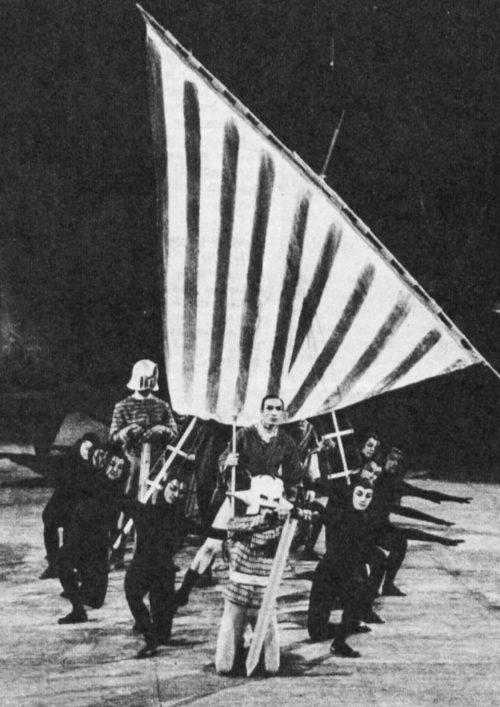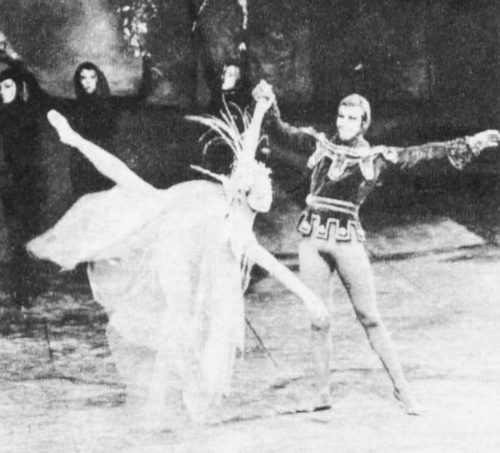A fairy tale for all ages
An unusual outside broadcast for Granada – ballet from Brussels


ON Wednesday Granada brings the spectacular modem Belgian stage show Four Brothers to British television.
I came to Brussels to see the show recorded, travelling with the 40 technicians — and three big vanloads of equipment — whose job it was to get the show for Britain.
And as the crews worked all out to convert the gigantic circular stage of the Cirque Royale in Brussels into a temporary television studio I discussed this remarkable show with some of the men responsible for it.

The story of Four Brothers? Let Herman Closson, the author, tell you.
He wrote the original play during the war, when Belgium was still under German occupation. The play went on tour but it came to an abrupt end — when some of the actors were thrown into gaol.
“It is a patriotic play, you see,” said M. Closson. ‘It tells the story of the four sons of Aymon — heroes of Belgian legend — who ride to the court of the Emperor Charlemagne to be knighted.
“The eldest of the brothers, Renaud, falls in love with a lady of the court — but has to fight a duel with a courtier.
“When he kills the courtier the soldiers of the Emperor turn on him and his brothers — but the magician Maugis sends Bayard, the flying steed, to their rescue.
“They flee to their father’s castle, pursued by the Emperor, and eventually are besieged there.
“Maugis helps them to kidnap Charlemagne as he sleeps, but they later repent and return him unharmed, and the Emperor forgives them their crimes. But Renaud has to go on a nightmare pilgrimage before he is allowed to return to his beloved.”
M. Closson spread his hands expressively.
“The German authorities did not like the play — they recognised it as a gesture of defiance.” he said. “Do you think the British will like it?”
I think they will, but having said that, my difficulty is in describing this show that really does defy adequate description. It fits into no theatrical category in my previous experience.
You like ballet? This is a ballet, then — dynamic and amusing — performed by the Twentieth Century Ballet of Brussels, one of Europe’s leading ballet companies.
“The ballet has no stars. We work as a team,” said Pierre Dobrievech, who plays Renaud. Teamwork, and no stars … but the dancers include some of the best in Belgium.
Vittoria Biaggi, Franco Romano and Jacques Saussin play the other three brothers. And Duska Sifnios and Tania Bari play the two principal female parts.
You don’t like ballet? Then don’t be put off.
Because you might like Westerns, or medieval horse-opera, or verse-speaking, or Japanese classical drama, or Edgar Rice-Burroughs, or theatre in the round … and it is all of these things as well.


Maurice Bejart, producer and choreographer, who has been a principal dancer with ballet companies all over the world, describes it this way:
“Four Brothers is not just a ballet. It is so many kinds of theatre rolled into one. With this production we have tried to do something entirely new.
“It is a fairy tale for people of all ages. We dip in and out of fantasy when the occasion demands. Our dancers dance to music — but not always to recognised music. They might be moving to 14th-century music. Or percussion. Or everyday sounds electronically distorted on a tape-recorder.”
Spectacle and surprise are the keynotes of M. Bejart’s production.
No effect is too technically difficult to achieve. Ten-foot giants stride the stage. A 40ft tower rises magically out of nowhere. A flying steed thunders into the centre of a courtyard. And, as a fitting climax to one of the court scenes, the hero and his rival, the courtier, play a game of chess with real people as pieces!
The man with one of the biggest problems in the show was Fernand Schirren, who was responsible for translating all of this into modem musical terms.
M. Schirren provides the percussion for each performance himself.
“The music has never been written down.” he said. “It is planned — but it comes out differently every performance. It is like jazz perhaps?
“I try to do with classical music what jazz musicians do with popular music. This way, it comes out fresh and exciting every night. The audience responds to the music, we respond to the audience, and everyone is satisfied.”



